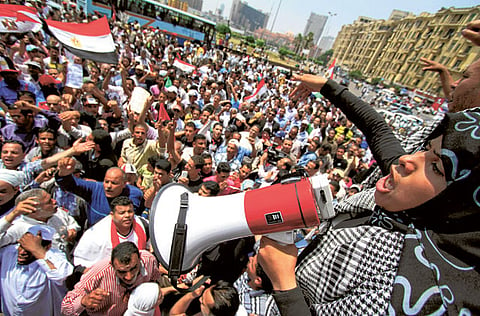Stability is priority for Arab Spring nations
The total amount pledged by various countries and international organisations reached $40 billion

Dubai: The international community, especially the European Union, has pledged an aid package of hundreds of millions of euros in support of the Arab Spring in Tunisia, Egypt and Libya, so as to help them continue on the path to democracy and rebuild their economies.
The total amount pledged by various countries and international organisations reached $40 billion (Dh146.9 billion), including $20 billion of aid and loans to Egypt and Tunisia over the next two years, to encourage them to carry out economic reforms that help stimulate economic growth.
The promise of aid packages was made specifically to Egypt and Tunisia, before Libya joined them on the path to democracy, so as to contribute to the recovery of the economies of these countries.
But while the money has been offered, Arab Spring countries may not be lucky enough to see the promise fulfilled, because it is made at a time when Western countries are suffering from consecutive financial crises.
That said, the stake of Western countries is only $10 billion out of the total amount — $40 billion — which does not sound like a lot of money when compared to the bailout packages made to Greece. The first bailout package alone reached $150 billion, in addition to bailout funds provided by the International Monetary Fund.
GCC contributon
The only funds received by Egypt and Tunisia so far are aid money pledged by the UAE, Saudi Arabia and Qatar, according to statements made by the finance ministers of Egypt and Tunisia. The GCC contribution is expected to reach $5-$7 billion, in addition to other facilities related to trade and bilateral cooperation.
The political events have caused severe damage to Arab economies. For example, the tourism sector on which Egypt and Tunisia depend is still suffering despite an end to hostilities there. The Arab tourism sector has so far suffered a loss of $7 billion, and losses by Egypt Air alone totalled $300 million in the first nine months of this year, at a time when growth fell to 1.8 per cent, down from 5.1 per cent in 2010.
In Libya, the oil output will not return to its normal level before 2013, while Yemen is on the brink of a real famine due to suspension of economic activities.
The living conditions of large sections of the populations of these countries have been affected by the ongoing events, while people have lost their jobs, often due to capital drain. Other reasons include the suspension or decline in the activities of key economic sectors, such as oil, tourism, transport, services and the infrastructure.
Although unemployment is one of the key reasons behind the outbreak of protests, now even more people have lost their jobs, a fact that puts more burden on the new authorities, especially in Tunisia and Egypt, which will need to create hundreds of thousands of job opportunities.
For this purpose, it has become necessary for both countries to swiftly bring economic life back to normal, instead of engagement in actions of revenge. This reflects clearly in Nelson Mandela's message to the people of Egypt and Tunisia, advising them against seeking revenge and instead to embrace tolerance.
Mandela's message is derived from his experience of tolerance rather than the spirit of revenge. No one can doubt Mandela's good faith and love of freedom after he spent 27 years in jail. He then succeeded in transforming his country into an emerging economy and then a member of the G20.
The issue of stopping the exit of investments and working to attract new investments must top the priorities of the new regimes in these countries, especially given the wealth of investment opportunities in Egypt, Tunisia and Libya. Also, there are a lot of investors, especially GCC ones, who wish to invest in the three countries, which need to restore stability first and bring things back to normal in order to revive the economic cycle.
Prioritise development
Unfortunately, things are not yet moving in this direction, as concerns now concentrate on trying the symbols of the toppled regimes and revenge. Despite the importance of accountability, it should not be a priority — the priority should be given to development and its related issues.
Thus, we cannot put the entire blame on the international community for slowing down the flow of aid pledged by them. In fact, the three countries are supposed to help the international community by creating appropriate conditions that attract investment.
Dr Mohammad Al Asoomi is a UAE economic expert.



